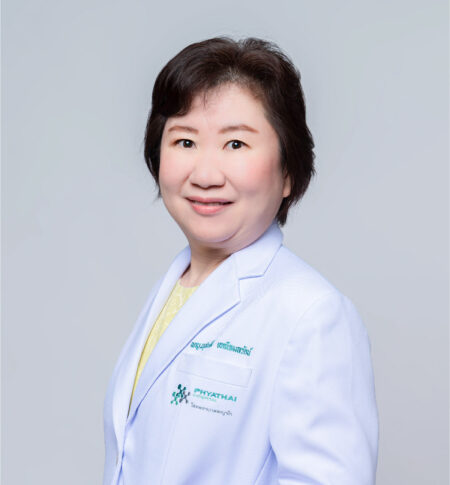
Dr. Yuttapon Tiaram
Dr. Yuttapon Tiaram completed his medical studies and graduated as a Doctor of Medicine from the Faculty of Medicine, Siriraj Hospital, Mahidol University. He then pursued further studies in Pediatric Medicine and Pediatric Cardiology at the same institution. Dr. Yuttapon shared his inspiration and experiences during his studies:
“As a physician, I had the opportunity to care for patients in various wards. When I began to work in the pediatric ward, I found children to be adorable and examining young patients brought me joy and happiness. Interacting with children, especially when they were unwell, evoked a sense of compassion. Seeing them recover and being joyful after getting better was heartwarming and charming in its own way. This experience motivated me to choose pediatric medicine for my specialization.
During my studies, I encountered numerous cases of pediatric heart diseases. The prevalence of congenital heart diseases in children is significant, and about 8 out of 1,000 births may have heart-related issues. Although most of these patients have a good chance of improvement or recovery, some cases present severe symptoms like difficulty breathing, extreme fatigue, and paleness, which are challenging to manage. However, once they recover, whether through surgery or medication, they often bounce back with remarkable improvement, resembling normal and healthy children. This brought me immense happiness and pride as a doctor.”
Treatment of Pediatric Heart Diseases
Pediatric heart patients can be divided into two groups: those born with heart conditions (congenital) and those who develop heart problems later in life. Therefore, there are cases that can be cured and cases that can be managed to lead a relatively normal life but require continuous monitoring. Dr. Yuttapon mentioned,
“Every pediatrician can handle general pediatric cases, but at Phyathai Sriracha Hospital, we have a specialized Pediatric Cardiology Clinic where we focus on treating patients in this specific area. As a pediatrician, I also have the opportunity to care for children receiving vaccinations and other general pediatric patients.”
Warning Signs of Pediatric Heart Diseases
After a child is born, pediatricians conduct various health checks. If there are suspicious signs indicating possible heart issues, such as abnormal heart sounds, signs of fatigue, inadequate oxygen levels in the blood, or greenish skin color, it becomes the responsibility of Dr. Yuttapon to assess the child’s heart health thoroughly. Sometimes, these symptoms may not be evident from birth but may manifest after the child receives vaccinations at specific ages like 1, 2, or 4 months. In such cases, the pediatrician will refer the child to Dr. Yuttapon to investigate and diagnose potential congenital heart conditions.
The dedication and passion of Dr. Yuttapon in caring for pediatric heart patients have been instrumental in bringing smiles and hope to numerous families. He strives to improve the quality of life for these children, ensuring they can live as close to a normal life as possible.
“Among the group of heart diseases that occur later in life and are not present from birth are conditions such as ‘Kawasaki disease,’ a disease characterized by inflammation of the heart and red blood vessels. Children with this condition often experience fluctuating fevers, red eyes, red lips, peeling skin on the hands, and a red rash. Another disease is ‘rheumatic heart disease,’ which is caused by a bacterial infection and is often found in families with a history of this condition. Children with this disease may experience symptoms such as fever, joint pain and swelling, subcutaneous nodules, red skin rash, easy fatigue, and shortness of breath. If any of these symptoms are observed, the child should be taken to see a doctor as soon as possible.”
Two impressive cases of heart disease management in children:
Case 1: There was a patient who initially showed no symptoms at birth. However, after about ten days, the child cried incessantly, appeared pale, and had low oxygen levels, only 60%. Upon arriving at the hospital with these symptoms, the emergency room doctor administered saline, oxygen, and medication to alleviate the initial condition of paleness. However, this case proved to be complicated as the child did not respond well after receiving medication, had low blood pressure, and was diagnosed with an infection. Subsequently, the doctor administered a drug to dilate the ‘PDA’ blood vessels, which increased blood flow to the lungs, and a drug to stimulate the heart, raising the blood pressure. The child’s condition improved as the blood pressure normalized, and oxygen levels improved. Further examinations, including an echocardiogram, revealed that the child had congenital heart disease of the cyanotic type. Given the child’s young age of only ten days and very small body weight of 2.7 kilograms, with poor oxygen levels, the doctor coordinated with a team of experts at Chulalongkorn Hospital to perform surgery to create artificial blood vessels, allowing better blood flow to the lungs. Currently, the child is safe, with oxygen levels considered good, and the doctor takes pride in contributing to the initial diagnosis and care, along with the referral to the specialized surgeon, which ultimately saved the life of this child.
Case 2: Another impressive case involved an older child with symptoms of chest pain, palpitations, near-fainting, and fatigue. After receiving treatment at the hospital, acute myopericarditis (inflammation of the heart muscles) was diagnosed, and the heart’s function was reduced. The parents were deeply worried as the child was previously healthy, with no underlying conditions. After explaining the situation to the patient and parents, treatment with IVIG (intravenous immunoglobulin) was initiated, and the child received treatment in the ICU for one night. Gradually, the symptoms improved in sequence, and currently, the patient is in good health, free from heart inflammation, and able to lead a normal life.
Apart from being a pediatric cardiologist, Dr. Yuttapon also serves as a medical professor at Burapha University, and he is often invited to deliver lectures and participate in discussions related to children’s health and infectious fevers. The clinic for pediatric heart disease utilizes modern technology to enhance diagnostic efficiency, such as using an echocardiogram, exercise stress testing on a treadmill or bike, and a 24-hour Holter monitor for continuous heart wave monitoring, which can be taken home for one day and then returned for physician interpretation and further diagnosis…”
“Besides technology, the doctor’s examination and care are crucial. To become a pediatrician, one must undoubtedly have a passion for the profession, compassion, a calm demeanor, and a high level of precision. This is because they must gradually examine and observe symptoms, investigate the underlying causes when a child is unwell, especially very young children who cannot speak and communicate their discomfort. The doctor must rely on observation, physical examination, and information from the child’s caregivers. Psychological skills are also essential during the examination, using various techniques to gain the child’s trust and cooperation, as young patients might naturally cry or feel anxious in a hospital setting. However, in general, pediatricians have a foundation of love and understanding for children, so there is no need to worry.
Typically, pediatricians in general hospitals take care of children from birth until they reach 15 years old. However, for those with heart conditions, pediatric cardiologists provide ongoing care even as the children grow into adulthood. This particularly applies to children born with heart conditions, as pediatric and adult heart diseases are different. Heart conditions in adults mainly involve the heart muscles, coronary arteries, or arrhythmias, whereas in children, they often relate to structural abnormalities in the heart. When it comes to children, the treating doctor will continuously manage their cases.”











